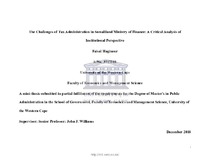The challenges of tax administration in Somaliland Ministry of Finance: a critical analysis of institutional perspective
Abstract
This research focuses on the challenges of tax administration in Somaliland Ministry of Finance (MOF). The study analyses existing
challenges in the MOF-Tax Administration, causes of these challenges, the impact of these challenges on domestic revenue collection
as well as the country’s economic growth and development. In order to obtain a desirable, comprehensive, and in-depth understanding
of the research problem, the researcher applied a mixed method approach, thereby limiting the weaknesses of using the quantitative or
qualitative research approach alone. The sample size consisted of 63 staff members. The research included 57 questionnaires for 57
employees and lower level managers as well as 6 interviews for top and middle-level managers in Somaliland Inland Revenue
Department. The data was analyzed using Statistical Package for Social Science (SPSS), Ms. Excel, and conceptual analysis, where
themes were developed and analyzed.
The key findings of the research were that Somaliland tax administration faces immense challenges that can be broadly grouped
into three categories: institutional challenges, attitudinal challenges as well as political and economic challenges. These challenges are
mainly due to the absence of professional staff, the lack of taxpayers’ education, outdated tax laws, non-compliance behavior of
taxpayers, rigidity of the tax system, and poor public trust amongst others. These challenges restrained tax revenue collection, public
service provision, investments, and economic growth issues. Therefore, the recommendations, accordingly made in this thesis, include,
amongst others, the need to establishing a professional training center for staff, automating tax procedure, implementing effective
performance appraisal system, and the regular updating of tax policies to establish a transparent, accountable and equitable tax system
in Somaliland.

